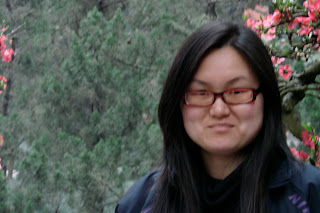
My trip to Sichuan Provence
My memory of Hong Qi village contains a bright green carpet of new winter wheat, bobbing yellow rape seed flowers and circular rice haystacks. I hear the oxen, cats, pigs and pekingese guard dogs. All animals talk, and people talk back to them. I’m the only one that doesn’t understand the conversation. I wait in this pasture of want and plenty for understanding to unfold.
 I went to Sichuan Provence with a service-learning project for high school students organized by Beilun High School teachers and my friend, Emma Chen. Emma owns Zenith Education, a skills school that teaches English to Chinese students evenings and weekends. Parents enroll their children in skills courses enhance instruction in regular school. Emma is fluent in English and a skilled translator. She is also an education reformer, carrying the conviction that learning should be more than rote memorization and grade chasing.
I went to Sichuan Provence with a service-learning project for high school students organized by Beilun High School teachers and my friend, Emma Chen. Emma owns Zenith Education, a skills school that teaches English to Chinese students evenings and weekends. Parents enroll their children in skills courses enhance instruction in regular school. Emma is fluent in English and a skilled translator. She is also an education reformer, carrying the conviction that learning should be more than rote memorization and grade chasing.
Conversations with Beilun H.S.’s Vice Principal, Mr. Li, told us he shared Emma’s vision. He wanted students to experience how the aftermath of the Sichuan earthquakes affected the province’s inhabitants. Together Emma and Mr. Li developed a service-learning project that would have students observe conditions, interview the villagers of Hang Qi and synthesize their findings into a report to the Teachers, the Village and to their fellow students.

We flew from Ningbo to Chengdu on a Thursday, a 3 hour flight. The students are from wealthy families, with a lot of international travel, money and electronic gear. Every student seemed to have an ipod, a cell phone, computer and a handheld translator and a brand new rollaway suitcase.
WE arrive at Chengdu airport and board a bus for Hangqi Village – another 3 hours driving through fields and fields of wheat, rice and rapeseed (canola oil plant). The atmosphere goes silent as we reach our destination. Everyone is tense and worried. We leave the bus, get our suitcases and walk for another ½ mile or so. The young people drag their brand new suitcases through the town on a brand new cement road. Then the road ends abruptly and we must carry our bags over dirt to a group of one-story cement buildings in the middle of farmland. This will be our base for the rest of the journey.

We stay with a group of volunteers from Ningbo and Beilun. This group has been in Hangqi since the earthquake – helping first with relief, rebuilding homes and now working with the villagers on development of jobs and education. The problems are complex and politically charged.
The volunteers are all quiet, thoughtful people, in it for the long haul. They have built living space for about 8 people, and the resident crew rotates every month. They give up work, salaries, family life and physical amenities like hot showers and soft beds to be here. The area is bleak, the Sichuan villagers from a different ethnic background. They eat extreme spicy food - not a favorite of Ningbo people. Sichuan Province suffers from poverty, earthquake PTSD and complex China politics. And if that were not enough, Sichuan dialect is as hard for the volunteers to understand as English.

I admire the brave optimism and grim realism of the volunteers. They remind me of the Kenyan Quaker women of Kakamega – taking on hard work that must be done because no one else will do it. I enjoy hearing people laugh and talk even though I can’t understand what they say. I catch words every so often – and can tell when someone is asking a question. Mostly I just watch the faces and expressions, especially with children and old people. Having to watch people so intently helps my drawing. I spend hours drawing the villagers, students and myself.
I experience visual fatigue after a day of watching faces and an aural fatigue from straining to make sense of Chinese words. I listen to short stories on my iPod at night just to rest my eyes and ears. At this time of night, even reading in English is too difficult, plus I don’t want to bother the other women sleeping around me. Some of the teens also listen to music at night under the heavy cotton quilts as well. Some text messages to family and friends back in Ningbo. They are still at it when I turn off my iPod and go to sleep.
Chinese young people adore electronics – computers, mp3 players, downloaded movies, and chatting. The Ningbo teens had every gadget available and talked about the items left at home with longing. I think some of the young men are serious gamers suffering withdrawl. I wonder about the future when I see how divorced from outside life they appear to be – as much as kids in the US. There is a difference with the village children - - they don’t have the resources of the Ningbo/Beilun students. The village boys had new ripsticks – they may have been New Year’s presents. They showed off how much better they were than the Ningbo guys. For skate boarding, being little is an asset.

No comments:
Post a Comment